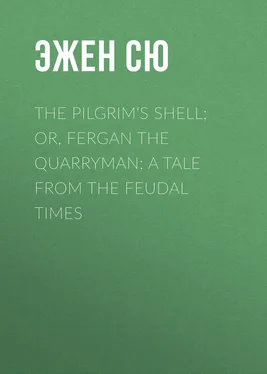Эжен Сю - The Pilgrim's Shell; Or, Fergan the Quarryman - A Tale from the Feudal Times
Здесь есть возможность читать онлайн «Эжен Сю - The Pilgrim's Shell; Or, Fergan the Quarryman - A Tale from the Feudal Times» — ознакомительный отрывок электронной книги совершенно бесплатно, а после прочтения отрывка купить полную версию. В некоторых случаях можно слушать аудио, скачать через торрент в формате fb2 и присутствует краткое содержание. Издательство: Иностранный паблик, Жанр: literature_19, foreign_antique, foreign_prose, на английском языке. Описание произведения, (предисловие) а так же отзывы посетителей доступны на портале библиотеки ЛибКат.
- Название:The Pilgrim's Shell; Or, Fergan the Quarryman: A Tale from the Feudal Times
- Автор:
- Издательство:Иностранный паблик
- Жанр:
- Год:неизвестен
- ISBN:нет данных
- Рейтинг книги:3 / 5. Голосов: 1
-
Избранное:Добавить в избранное
- Отзывы:
-
Ваша оценка:
- 60
- 1
- 2
- 3
- 4
- 5
The Pilgrim's Shell; Or, Fergan the Quarryman: A Tale from the Feudal Times: краткое содержание, описание и аннотация
Предлагаем к чтению аннотацию, описание, краткое содержание или предисловие (зависит от того, что написал сам автор книги «The Pilgrim's Shell; Or, Fergan the Quarryman: A Tale from the Feudal Times»). Если вы не нашли необходимую информацию о книге — напишите в комментариях, мы постараемся отыскать её.
The Pilgrim's Shell; Or, Fergan the Quarryman: A Tale from the Feudal Times — читать онлайн ознакомительный отрывок
Ниже представлен текст книги, разбитый по страницам. Система сохранения места последней прочитанной страницы, позволяет с удобством читать онлайн бесплатно книгу «The Pilgrim's Shell; Or, Fergan the Quarryman: A Tale from the Feudal Times», без необходимости каждый раз заново искать на чём Вы остановились. Поставьте закладку, и сможете в любой момент перейти на страницу, на которой закончили чтение.
Интервал:
Закладка:
The court was also attended by noble vassals of Neroweg, owners of smaller fortified places or of manors, held under the Count of Plouernel, the suzerain of these fiefs, the same as Neroweg, a vassal of William IX., Duke of Aquitaine, held under that suzerain, who, as vassal of Philip I., in turn held of that French King, the supreme sovereign. This hierarchy of all feudal seigniories existed in name only, never in fact. The great vassals, veritable sovereigns, entrenched in their duchies, laughed at the impotent authority of the King. In turn, the sovereignty of the dukes was almost despised, contested or attacked by their vassals, who were absolute masters in their seigniories, as the dukes in their duchies. The immediate vassalage, however, such as rested on the vassals of the seigniory of Plouernel, was ever enforced in all its fullness and tyrannic severity. There, at any time, the implacable vengeance of the suzerain could reach directly the goods and chattels of the recalcitrant vassal. Among the people who had come from the city, from the fortified cities or from their manors, was a handsome young girl, accompanied by her mother. Sad and uneasy, the two exchanged alarmed looks when the seigneur of Plouernel, entering the law court with a somber mien, sat down on a throne, one son at his right, the other at his left, and ordered Garin the Serf-eater to call the roll of cases entered for the session.
The bailiff bore no further mark of the wound he had received from Pierrine the Goat than a plaster on his forehead. He took up a scroll and commenced calling up the list of cases:
"Gerhard, son of Hugh, who died last month, succeeds his father in the fief of Heute-Mont, held under the Count of Plouernel. He comes to acquit the right of relief, and to pledge fealty and homage to his suzerain."
Thereupon, a man still young, covered with a leather casque and carrying at his side a long sword, stepped forth from the group of persons who had come to the session of the court. He came forward holding in his hand a large purse filled with money, and placed it on the stone table, thus acquitting the right of relief due the seigneur by all vassals who take possession of their inheritance. Then, upon a sign of the bailiff, the new castellan of Heute-Mont, taking off his casque and unbuckling the belt of his sword, placed himself humbly on both knees before the seigneur of Plouernel. The bailiff, however, noticing that the country squire, having come on horseback, retained his spurs, addressed him in an angry tone: "Vassal, dare you take the pledge of fealty and homage to your seigneur with the spurs at your heels?"
The young castellan repaired the incongruity by removing his spurs and dropping back upon his knees at the feet of Neroweg, with hands joined and head lowered, he humbly waited for his seigneur to pronounce the consecrated formula: "You acknowledge yourself my liege as the holder of a fief in my seigniory?"
"Yes, my seigneur."
"You swear upon your soul never to carry arms against me, and to serve and defend me against my enemies?"
"I swear it, my seigneur."
"Keep thy oath. At the first felonious infraction thy fief reverts to me!"
Gerhard rose, replaced his spurs and buckled on the belt of his sword, while casting a sad look upon the purse of money with which he had paid his right of relief.
After the lord of Heute-Mont, a richly dressed young girl stepped forward, uneasy, trembling and her eyes full of tears. Her mother, not less moved than herself, accompanied her. When both were a few steps from the stone table, the seigneur of Plouernel said to the damsel: "Have you decided to obey the orders of your suzerain?"
"Monseigneur," answered the young girl, in a feeble and suppliant voice, "it is impossible for me to resign myself to – "
She could not finish. Sobs smothered her words, and, breaking out in tears, she dropped her head upon the shoulder of her mother, who said to the Count: "My good seigneur, my daughter loves Eucher, one of your own vassals. Eucher loves my daughter Yolande no less tenderly. The union of these two children would make the happiness of my life – "
"No! no!" interrupted the seigneur of Plouernel, in a towering rage. "By the death of her father Yolande holds a fief under my seigniory. Mine alone is the right to dispose of her in marriage. She must choose a husband from among the three men whom, according to our usage, I have designated. They are three Franks, that is, nobles – Richard, Enquerrand and Conrad. The eldest of them not being yet sixty years old, the age limit is observed. Does Yolande accept one of my three lieges for her husband?"
"Oh, seigneur," replied the mother imploringly, while the young girl sobbed aloud, "Richard is mean looking and blind of one eye; Conrad is a murderer; he killed his first wife in a fit of passion; Enquerrand is lame, wicked and feared by all who come near him, moreover, he is too old for my daughter, he will be sixty years within two months. None of them is fit for Yolande."
"Your daughter, accordingly, refuses to wed one of the three men presented by me?"
"Seigneur, she wishes no other husband than Eucher; and I may assure you the lad is worthy of the love of my daughter."
"The devil! We have had words enough. If your daughter insists upon refusing to select from among my men, and marries Eucher, the fief reverts to me. It is my right. I shall enforce it."
"In the name of heaven, monseigneur, if you appropriate our lands what shall we live on? Are we to beg our bread? Have pity upon us!"
Yolande raised her beautiful face, pale and wet with tears, took a step towards Neroweg, and said, with dignity: "Keep the heritage of my father. I prefer to live in poverty with him whom I love than to wed any of these men of yours who inspire me with horror."
"My daughter!" exclaimed the distracted mother, "disobedience to the seigneur of Plouernel means misery for us!"
"Marriage with one of the three men proposed, means death to me," answered the poor child.
"Seigneur, good seigneur!" resumed the stricken mother, "deign to allow Yolande to remain a spinster. You would not force her to the choice between our ruin and a marriage that horrifies her?"
"No fief can remain in the possession of a woman," was the sententious utterance of the bailiff. "Usage is opposed to it."
"We have had enough of words!" cried out Neroweg, stamping the ground with rage. "This young woman refuses to wed one of my men. The fief is now mine. Bailiff, you will this evening send a force to take possession of the house and all its contents. You will eject the two women."
"Mother, let's depart," said Yolande, proudly. "We once were free and happy; now we are no better than serfs. But I prefer their sad lot to that reserved for me by Count Neroweg in delivering me to one of his bandits."
Undoubtedly the seigneur of Plouernel would have revenged himself for the bitter reproaches of Yolande had he not been prevented by the sudden arrival of one of his men, who, running in all out of breath, brought news of the arrest of the Bishop of Nantes, who had appeared at the toll gate disguised as a mendicant friar, and was recognized by one of the guards.
"The Bishop of Nantes in my power!" exclaimed Neroweg. "Azenor predicted it. Her magic charm begins to operate!" He rose precipitately from his throne, and, followed by his sons and several of his equerries, ran to meet the bishop, his enemy, who was being led a prisoner, together with the other travelers captured by the armed guards posted at the toll gate. Bezenecq the Rich and his daughter Isoline accompanied Simon, the Bishop of Nantes, and the monk Jeronimo, clad like a prelate. After his vain efforts to induce the travelers not to cross the seigniory of Plouernel, the bishop had, nevertheless, joined them, not venturing to enter alone with Jeronimo upon the territory of the seigneur of Castel-Redon, and hoping he would pass unperceived amidst a numerous troop. Unhappily for him, among the guards at the gate was a soldier named Robin the Nantesian, who had lived in the city of Nantes, and where he had opportunity to see the leading personages among the inhabitants. He quickly pointed out Bezenecq the Rich as a townsman from whom it would be easy to extract a big ransom. Noticing, thereupon, a monk, who seemed anxious to keep his cowl over his head, he pulled the frock off the monk and recognized the Bishop of Nantes, a personal enemy of the Count. The men of Neroweg then seized the two friars, pinioned them, as well as Bezenecq and his daughter, and accepted the toll from the other passengers, whom they allowed to pursue their journey. The bourgeois of Nantes, bound upon his mule, with his daughter bathed in tears at the crupper, was carried to the castle, with the bishop and Jeronimo, their hands tied behind their backs, following on foot. When the captives arrived at the first court-yard of the castle, Bezenecq alighted from the saddle, and, freed from his bandages, he held up his daughter, ready to faint. The bishop, pale as death, leaned upon the arm of Jeronimo, whose resolute carriage betrayed no fears. Neroweg, accompanied by his sons, arrested his hurrying steps when he came close to the prisoners, and, addressing them, said, sardonically: "I greet you, Simon! I greet you, holy man, my father in Christ! I hardly looked for this joyful meeting!"
Читать дальшеИнтервал:
Закладка:
Похожие книги на «The Pilgrim's Shell; Or, Fergan the Quarryman: A Tale from the Feudal Times»
Представляем Вашему вниманию похожие книги на «The Pilgrim's Shell; Or, Fergan the Quarryman: A Tale from the Feudal Times» списком для выбора. Мы отобрали схожую по названию и смыслу литературу в надежде предоставить читателям больше вариантов отыскать новые, интересные, ещё непрочитанные произведения.
Обсуждение, отзывы о книге «The Pilgrim's Shell; Or, Fergan the Quarryman: A Tale from the Feudal Times» и просто собственные мнения читателей. Оставьте ваши комментарии, напишите, что Вы думаете о произведении, его смысле или главных героях. Укажите что конкретно понравилось, а что нет, и почему Вы так считаете.












